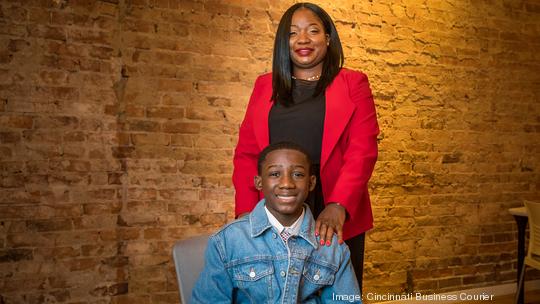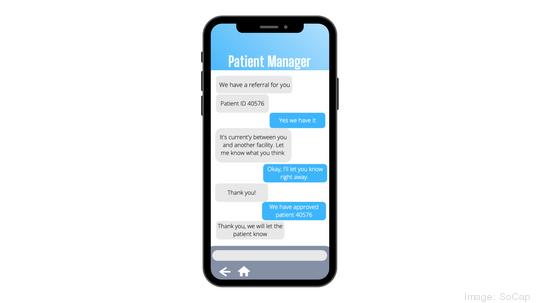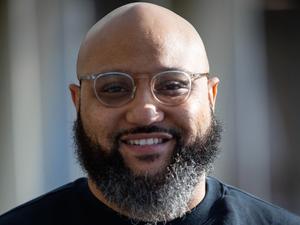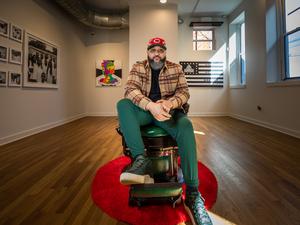
For years, the idea has been building in the back of Ashley Barrow’s mind.
The Forest Park resident and nurse case manager knows firsthand how confusing the referral and discharge process can be, when patients, for example, go from acute to post-acute care. She experienced it on a more personal level when her sister had some serious health care struggles of her own and wound up in the wrong level of care.
But it wasn’t until the throes of Covid-19, with her kids remote learning due to school-related lockdowns, that her idea came more into frame. Barrow, in recent months, has launched a new startup, Re-Assist, a referral management app, to better help individuals navigate transitions of care.
The kicker: All the tech behind the company’s product has been developed by her 12-year old son, Aaron Bess.
In between juggling homework, basketball — Barrow said Bess was voted “most coachable” on his team — and serving as a junior deacon at church, the duo have developed a prototype for their product and a potential customer base: Hospital and health care systems, even nonprofits and mental health providers.
The app would take a process that’s largely manual — patients often are handled a paper list with names of potential resources — and “automate, streamline and digitize it,” she said, to save time and improve efficiencies.
“With everything I’ve seen, I just thought, ‘There’s got to be a better way,’” she said. “You’re handed this paper list, and you try to look things up online, but you can’t find the websites. The social worker doesn’t really know, so you’re calling the place, and then there’s all these new hurdles with Covid. It’s confusing during a time of crisis, and people are basically picking the first place they can find, and it sometimes ends up being inadequate.
“I think this will save lives,” she said.
Re-Assist recently wrapped SoCap Accelerate’s spring cohort and is by far the earliest company the health-focused accelerator has accepted. SoCap, which is backed by Northern Kentucky University and St. Elizabeth Healthcare, traditionally looks at companies on the verge of raising capital, but Re-Assist was just one step beyond the “idea on a napkin” phase.
Rico Grant, a local entrepreneur and SoCap’s executive director, said ReAssist made the cut (SoCap only took six companies for its latest class) largely based on passion. He said the app is aiming to solve a huge unmet need.
“The idea is phenomenal,” he said. “The hustle and what that they bring to the product – the whole hack aspect – it was there. We just couldn’t pass on this group.”

Bess, a student at Hamilton County Mathematics and Science Academy, a charter school in Colerain Township, had prior experience building websites but had never developed an app before. He largely self-taught himself the process. And Barrow has dug deep into the market research. She said there’s currently not a product like this on the market.
“It’s about better outcomes, about better quality of life,” she said. “We know we could decrease length of stay, and we know it’s going to be more cost effective, and readmissions will go down because we’re adding use of technology, education and the power of choice.”
That latter fact is the key. Re-Assist, Barrow said, is built like a triangle. The patient sits at the top; care managers, social workers or account managers live on one side; and vendors or community resources sit on the other. The app will include reviews, contact information, certified staff, accepted insurance and more.
The idea is for everyone to work together using an automated system that allows followup and communication in real time.
“We want to help people in transitions of care make a more educated choice,” she said. “It can’t be cookie cutter. We’ve got to put it in a format that’s simple and easy for patients to understand.”
Now that SoCap has wrapped – the spring cohort held its demo day in May – Barrow is thinking ahead to the next step. Re-Assist is now certified in Ohio as a Minority Business Enterprise, Women Business Enterprise and an EDGE entity, a program designed to assist socially and economically disadvantaged businesses in obtaining state government contracts.
She wants to use the connections made during the accelerator to further build out the idea. Grant said that will be vital to the company’s ultimate success.
The hope is to release a beta version of the app sometime this fall.
“The moonshot goal is for a Mercy or Tri-Health to see this and say, ‘We need this,’ and then partnering to help because they have the resources,” Grant said. “Resources aren’t just all about investment dollars. It can be, ‘We’ll loan you a digital team for 90 days to build out this more robust version of this product.’ It’s those kinds of things that need to happen. We know there’s people passionate about this. Let’s see who’s intentional in our region.”








